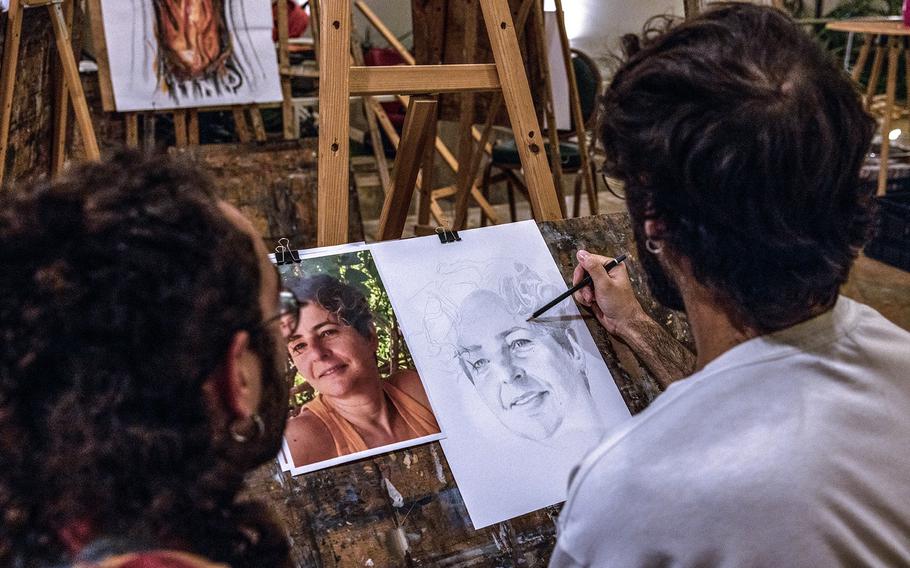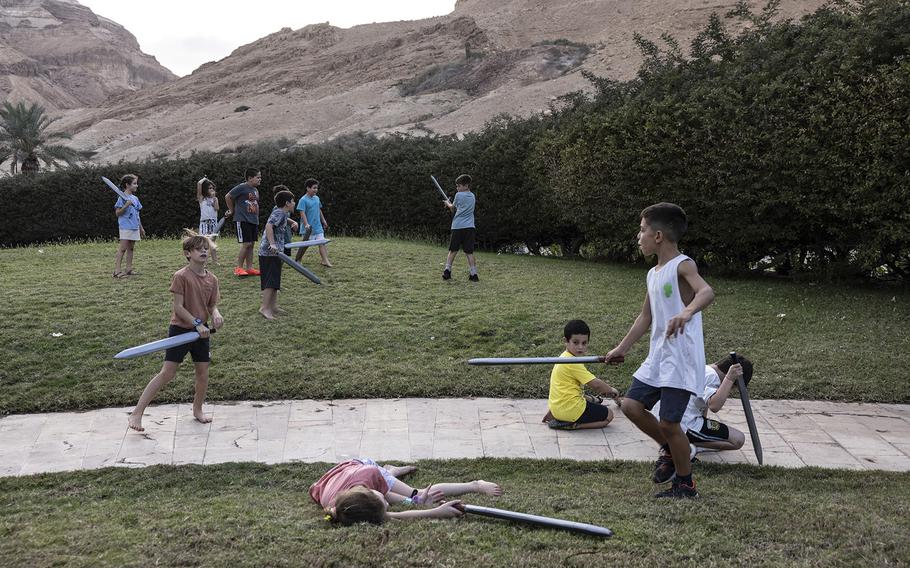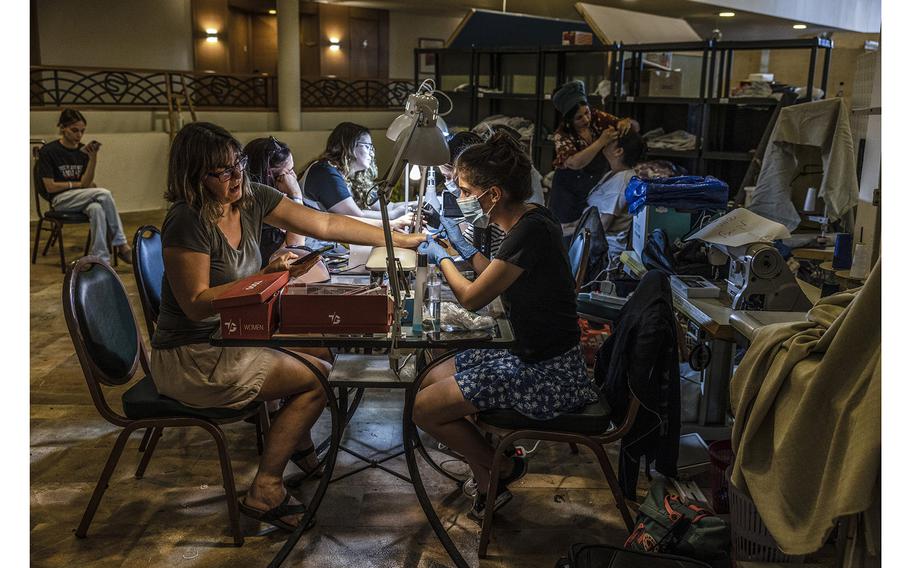
Tal Simon, 29, works from a photograph to sketch a portrait of Yasmin Bira, who was killed in the Hamas Oct. 7, 2023, attack. (Heidi Levine for The Washington Post.)
EIN BOKEK, Israel - The resort on the Dead Sea looks like what it is: A nice, bright white, banal holiday hotel, with a swimming pool and palm trees, bars and balconies.
This is a disguise. For its current guests, the hotel is a trauma center.
Today the David Dead Sea Resort and Spa serves as way station, as an evacuation camp for members of one the communities hit hardest by the Hamas surprise attack six weeks ago - one that lost 10 percent of its residents in a single day.
In the hallways, parents in flip flops and donated T-shirts push strollers. There are many children. The kids are everywhere. They kick soccer balls in the soaring atrium lobby. They leave their ice cream melting on the couches. No one stops them.
Why? Because the children must be distracted, because the moms and dads - the ones who are not dead or missing - sometimes must go to their rooms and close the drapes. To make more phone calls, appealing for help for family members held hostage in Gaza. To plan funerals. To weep.
The resort is a surreal spa for survivors of the worst attack against Jews since the Holocaust.
Some guests compare it to a waiting room, where they fear what might come next. They describe a strange and terrible twilight: the horror not over, the future yet to begin.
The hotel is a temporary home for 900 members of the Kibbutz Beeri, a farming cooperative that sits aside the Gaza border, which was overrun by Hamas fighters on Oct. 7, and where the savagery, burning, looting - and the last stands by its residents - went on for more than 18 hours.
Now they’re in Ein Bokek, some 75 miles from home.

Children of Kibbutz Beeri play with plastic swords on the hotel grounds. (Heidi Levine for The Washington Post.)
Alon Pauker, a bespectacled historian, welcomed us to his room. “Sorry,” he said. “It is not a holiday room. It is a refugee room.” The space was piled with suitcases, clothes, paperwork, donations. Pauker serves as an informal spokesman for the survivors.
Earlier, giving directions to the resort, Pauker said “yes, we are at the Dead Sea. Our own dead sea. We understand this.”
He agreed to help us speak with his neighbors. He had just one, simple request. “Go slow with them. They are not okay.”
They are living at one of the lowest points on Earth. Four hundred and thirty meters below sea level.
Even getting through the basic math is painful.
Pauker began by telling us there were 1,200 people living in Beeri before the Hamas attack. Then he corrected himself. There were 1,100 alive now.
He said 87 were murdered. Then: 89. He apologized. Two more had been confirmed dead.
The next day, the tally was 90.
Twenty-five were still missing. They included men, women, the elderly, children. They’re believed to have been taken to Gaza by Hamas fighters and other militants and held as hostages. Many of them smile in photos on display in the hotel lobby under the word: KIDNAPPED. Candles burn next to their portraits.
Tal Simon, a 29-year-old artist from the kibbutz, sat in a corner at an easel. He sketched a portrait of Yasmin Bira. He worked from a color photograph, carefully trying to revive her face. “I keep thinking that I will walk down the street and be able to give her the drawing, but then I remember she is gone.”
There are so many, Pauker confessed, that “I cannot remember anymore who is alive and who is dead.” In all, some 1,200 people in Israel were killed on Oct. 7. Two hundred and forty were taken hostage.
The Beeri kibbutz was one of the oldest in Israel. It was unusual in retaining its founding socialist, cooperative model. And it was relatively prosperous, with avocado and citrus orchards, and a printing facility.
Its members traditionally lean to Israel’s political center, but hardened by the challenges of living on the front lines. They employed Palestinian workers from Gaza to help them work their fields; many residents speak some Arabic; they drove Gazan cancer patients to their hospital appointments in Israel; many of them supported two states for two people.
They feel differently now.
They are angry. They are hollowed out. Many feel betrayed by the government of Prime Minister Benjamin Netanyahu. But not, they stress, by the Israeli people.
The kibbutz is trying hard to stay together.
“I know we are stronger that way,” said Simon David King, 59, originally from England, a member of the kibbutz since 1984.
“I can’t imagine being alone,” he said. “Some people wouldn’t make it alone. It’s too much.”
Tal Shani, 47, remembers hearing rockets and explosions early on the morning of Oct. 7. At first, she didn’t think much of it. These things happen on the Gaza border. “I was calm. We were safe.”
It was a Saturday. Her kids slept in. She didn’t wake them.
By the end of the end of the day, Shani had briefly been taken captive, seen her 16-year-old son, Amit, taken away by Hamas to Gaza. Her ex-husband Nir, who lives on the kibbutz, texted to say “I can’t breathe. I’m not going to make it.” His house was under attack, the homes around him on fire. “Tell the kids I love them.”
He survived.
After her son was taken, Shani fled to another home and hid with her daughters for hours. She lay atop their bodies. At the front door was a bag of grenades, abandoned by Hamas. They tried not to make a sound.
We sat on the hotel patio near the salt ponds of the Dead Sea, waving away flies. On the trim lawn, kids waved plastic swords. A couple of men drank beers. You could smell marijuana burning, from somewhere.
“I am sitting here with you now and I look normal,” Shani said. “But I can say I am not normal.”
The first two weeks at the hotel, she said, “I was crying all the time.”
At first, she said, “I wished they had shot us.”
“I couldn’t breathe,” she said. “I couldn’t imagine the next breath. How to survive? The next day? The next minute?”
Her friends told her she looked “like a dead woman walking.” For the first time in her life, she said, she felt gravity as a physical force, pressing her down. She mostly stopped eating.
The hotel offers massage, manicures, hair styling. There are yoga classes, bicycle rides, culture nights. All from volunteers.
There are many therapists.
Shani forced herself to begin recovering. There was a reason she survived, she believed: her children. “Not so my kids could visit their crazy mother in a mental hospital.”
She was certain her son Amit was alive and would return. She imagined a ball of light that she would throw to Gaza. Her son would appear in the light. They would talk.
“I imagine the hug. I really feel it. I can smell him.”
Shani and others confessed to survivor’s guilt.
Golan Abitbol, 44, described firing a pistol from inside his kitchen window as Hamas fighters approached, on and off for hours, while his wife and four children sheltered behind him in a safe room.
“I could have done more,” he said.
What more could he have done?
Abitbol said his family was okay. But the fear, the loss, the reality of what they’ve survived, he said, “it is going to marinate . . . and then it will pop.”
“We are never going to be the same as we were the day before.”

Survivors of the Hamas Oct. 7, 2023, attack receive manicures and other treatments provided by volunteers at the hotel. (Heidi Levine for The Washington Post.)
Within a week of the attack, Abitbol was back serving in his Israeli military reserve unit, which analyzes DNA samples. He helps identify the dead.
Some members had gone back to assess what was left of their homes. Many had not. Some were helping with the avocado harvest. They went and returned.
What would come next for the Kibbutz Beeri? Many members wanted to go back to rebuild their lives. There are fields to tend, houses to rebuild.
Others were not so sure.
“I was never afraid,” Shani said. “Now I am afraid.”
“I don’t have trust in our country, in our army. I don’t want my children to serve as the wall.”
Pauker called himself a “a peace supporter.” But he said he wouldn’t go back until Hamas was destroyed as a military and political force.
There was a desire to stay together. There was talk of moving from the spa to an interim space, such as a high-rise in Jerusalem or a rural community somewhere down south. Then maybe go back in a year.
Even now, while the war was being waged, some kibbutzniks worried the wider world had already moved on from their losses - to the toll in Gaza.
The Gazan health ministry said last week that more than 11,100 people there had died since the Israeli government announced its operation to root Hamas out of the enclave for good. The ministry has since stopped counting.
Yehudit Weiss was a mother of five at Kibbutz Beeri. She was taken by Hamas fighters on Oct. 7. Zemer Weiss, her daughter-in-law, sat with us in the lobby and spoke of her hopes of seeing her again.
“Do you want us to tell you about her?” she asked. She described a dedicated schoolteacher, a loving grandmother, a generous cook, a friend to all, who was undergoing treatment for cancer when she was taken captive.
The next day, the Israeli military announced it had found Weiss’s body at a house near al-Shifa hospital in Gaza City.
Shachar May, press officer for the Israeli humanitarian relief organization IsraAid, said 150,000 Israelis have been displaced by the war in Gaza in the south and by rocket fire from Hezbollah in the north. They include 60,000 people now living in beach hotels in Eilat and 16,000 in the Dead Sea resorts.
Many of their stories are probably the same.
Judith Sudilovsky in Jerusalem and Heidi Levine in Ein Bokek contributed to this report.